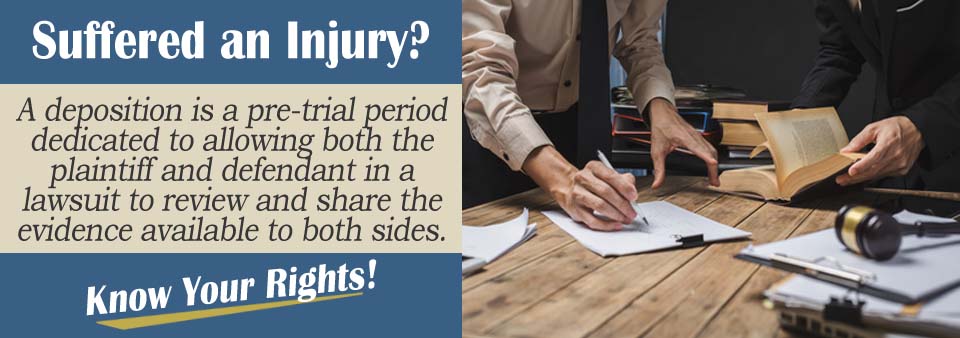If you have been injured through no fault of your own and have filed a personal injury lawsuit against whoever you think is at fault, you will be hoping to negotiate a settlement as quickly as possible.
This depends partly on the skill and expertise of your personal injury attorney as well as the effectiveness of the evidence you have to support your case against the part or parties at fault. Protracted negotiations may involve a trial. Before the trial takes place, there may be a process called discovery.
This is a process in which both sides are allowed to find out what evidence the other side has. Witness statements under oath, called depositions, may be required.
All evidence at discovery is intended to streamline the actual trial and may even remove the need for it if an agreement is possible after a review of all the evidence available.
The Basics of Deposition
Depositions are part of the process of discovery, which is a pre-trial period dedicated to allowing both the plaintiff and defendant in a lawsuit review and share the evidence available to both sides. Discovery is not limited to personal injury lawsuits.
It may be a normal process called by one or both sides before any trial. Discovery includes a review of any documents which shed light on the case, as well as written questions, called interrogatories in addition to sworn statements from witnesses.
The success of a personal injury case depends heavily on supporting evidence. That means depositions from eye witnesses who were present at the scene of an accident, or from experts whose opinions about certain aspects of the case are relevant, can make or break the lawsuit.

What Actually Happens During a Deposition?
Depositions are the only part of discovery that involves the need for a real, live human being to be present to answer questions on oath. It is unlikely that depositions would be heard at a courthouse.
They are more likely to be heard at the office of one of the attorneys representing either the insurer or defendant or the personal injury attorney representing the plaintiff.
The witnesses will be asked a series of questions and will be expected to answer them as clearly as possible under oath. The fact that they must answer under oath gives the answers more validity. The witnesses, called ‘deponents,’ are not expected to take part except to provide answers.
Attorneys for the opposing side may object to some of the questions as they have the right in a trial, but generally, the questions tend to be more wide ranging than during the trail itself, although some of the deposition may be ruled as inadmissible later.
Depositions are either recorded by a court clerk in writing, then printed off for both parties, or video recorded.
You Will Need a Personal Injury Attorney to Guide You Through the Discovery Process
Filing a personal injury lawsuit is a serious business. It would be sensible to engage a personal injury attorney to provide advice, review supporting evidence and negotiate with the at-fault party’s insurer to achieve a satisfactory outcome.
It is important that if the lawsuit is likely to lead to a trial that you have chosen a suitably experienced attorney to guide you through the trial process, including the period allocated to discovery.